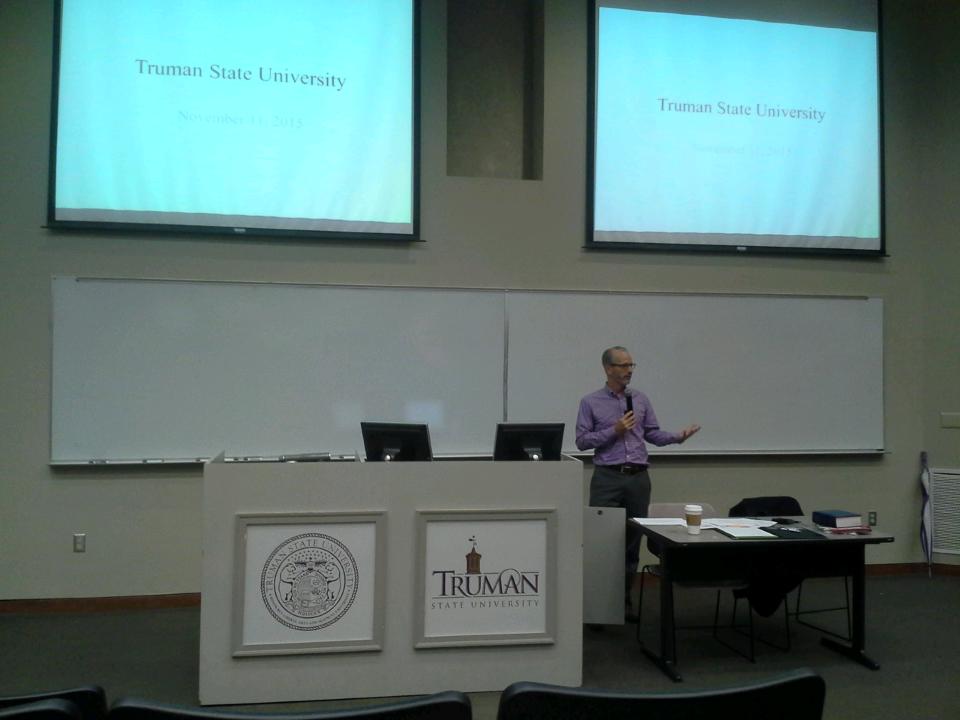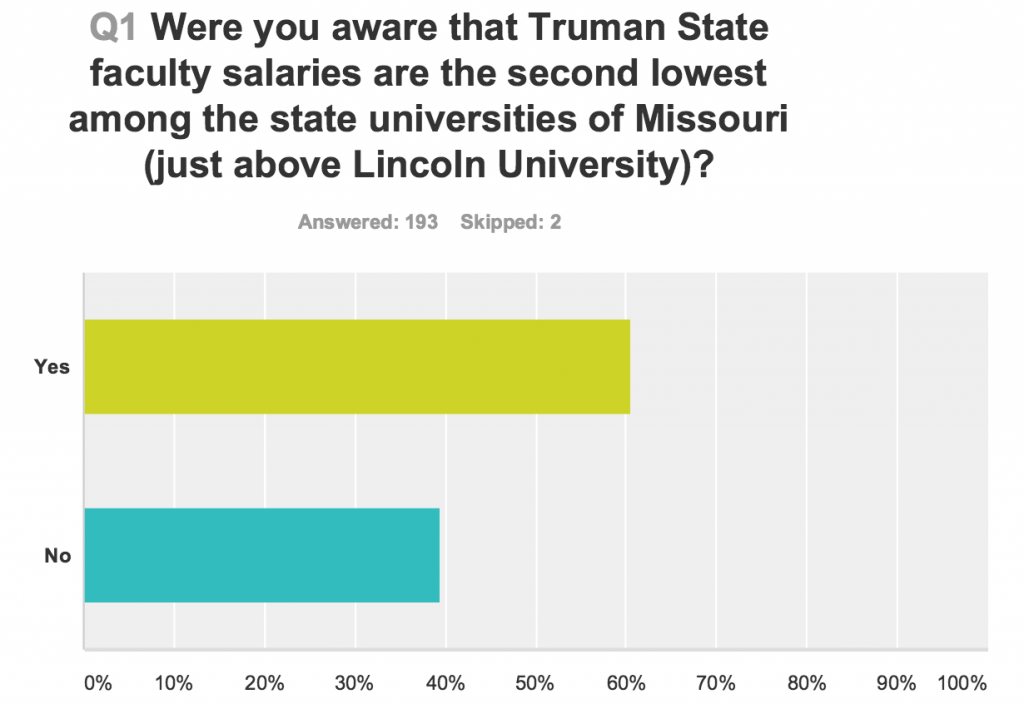
Members of Truman State’s chapter the American Association of University Professors (AAUP) met with University President Troy Paino last week in an open forum to to discuss faculty salaries at Truman, which are some of the lowest in Missouri among comparable institutions.
History professor David Robinson gave a presentation at the beginning of the forum which outlined the data behind the AAUP’s claims. According to publicly available data from the U.S. Department of Education’s Integrated Postsecondary Data System (IPEDS), Lincoln University is the only comparable institution in Missouri with lower faculty salaries than Truman.
The AAUP sent out a survey to faculty asking them if they were aware that Truman faculty were paid less than at comparable institutions. When a significant number answered no, the organization called the forum.
“Most people don’t know that the faculty are paid poorly at Truman State,” Robinson says. “Our students don’t seem to know this.”

Robinson says one of his concerns is balancing merit and need-based scholarships, as merit scholarships can often go to students who technically do not need them.
“I want us to be more honest about what we’re doing here,” Robinson says. “And at whose expense we are doing it.”
Robinson, who has been teaching at Truman since 1990, says the AAUP has met with every new provost and president since 1985 at least, but the most recent meeting drew a much larger turnout than the usual 20 to 25. He says it is a tough problem and he wants Paino to make fixing it more of a priority.
“We’ve never had a president, at least for very long, who cared about this problem at all,” Robinson says. “I’ve considered [Paino] one of the most capable people ever to land on our campus, and in so many different ways.”
The President Weighs In
Paino gave his own presentation at the forum highlighting the history and context of the problem of low faculty salaries.
“I’m not coming here trying to argue that our faculty are adequately paid — that’s wrong. The question is how we get from where we are to where we would like to be.”
– President Troy Paino
Paino says many of the current aspects of Truman, including its mission as a liberal arts and sciences university, were engineered during the 1980s and 1990s, a period when the state of Missouri was making large and consistent investments in higher education. Paino says tuition increases were also common during this period, with an average increase of approximately 11 percent per year from 1986 to 2005. According to the data presented at the forum, these two critical sources of revenue — state appropriations and tuition and fees — have both taken hits during more recent years, with state appropriations dropping and fluctuating since 2000 and tuition remaining almost constant since 2005.
The combination of these factors, Paino says, contribute to the constriction of Truman’s budget. Truman also discounts $20 million in scholarships to students each year, or approximately $3,800 per student, which is significantly higher than any other comparable Missouri institution. Paino says this high figure is important to maintain because of Truman’s mission as a highly selective institution, but also factoring in the difficulty of attracting students to rural northeast Missouri.
Paino says any plan for increasing salaries will involve balancing the budget elsewhere. One option he says could be explored is the closure of low-enrolled programs — ones graduating fewer than five students per year.
“I think everyone has to realize that solving the problem is going to involve tradeoffs,” Paino says.
More Discussion Needed
Paino says he plans to bring the issue before the faculty senate — the representative body of the faculty who are elected on behalf of their departments.
“For me to deal with the formal governance structure, I think I should work with faculty senate on this,” Paino says. “I’m going to ask them directly on how they’d like to proceed.”
Paino presented a five-step plan at the forum that included an additional $1,000 increase for full professors with six years of service and higher starting salaries to attract new faculty. Although alternative plans were suggested at the forum by faculty, Paino says if anyone wishing to submit an alternative should go through faculty senate. He says no alternative plans have officially been submitted.
“I’ve been proceeding based on the five points I presented at the forum,” Paino says. “If the faculty want to go another direction, if they think that that’s not addressing the issue quickly enough … I am open to a different pathway.”
Truman has about $50 million in reserve funds, which Paino says are important to maintain in case of a financial emergency. The amount of money held in reserves affects Truman’s Moody Rating, a metric that describes Truman’s ability to pay off debt in the future.
David Rector, Vice President for Administration, Finance and Planning, says the reserves are to be used for emergencies and not to underwrite expenses such as faculty raises.
“You [could give] them a raise one year, but how are you going to pay for it the next year?” Rector says. “It’s one-time money.”
Salaries Impact Professor Morale
Music professor Marc Rice is the president of AAUP at Truman. Rice says the forum was productive, and he appreciated that everyone involved, including Paino, listened attentively.
“I was left with the impression that the administration understands that there is a pretty significant problem [with faculty salaries],” Rice says.
Rice says faculty salaries have been the most pressing issue for AAUP recently, and he says he estimates that 70 to 80 percent of their time at their meetings is taken up with discussions about salaries. He says the AAUP plans to continue to listen to the faculty and see what the majority support, and eventually the AAUP will likely draft a proposal to present to the faculty senate.
Rice says the issue of salaries is important because it affects the attitude of Truman’s faculty.
“Students should be concerned about this issue primarily because it impacts faculty morale, how we feel about being here”
– Marc Rice, music professor and president of AAUP
